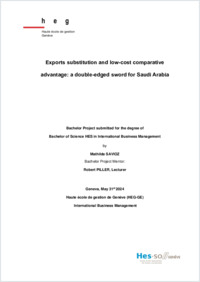Exports substitution and low-cost comparative advantage : a double-edged sword for Saudi Arabia
SONAR|HES-SO
- Savioz, Mathilde
- Piller, Robert (Degree supervisor)
- Genève : Haute école de gestion de Genève
89 p.
Bachelor of Science HES-SO in International Business Management: Haute école de gestion de Genève, 2024
English
The Bachelor project aims to explore the implications of Saudi Arabia's reliance on low-cost oil production for its economic diversification efforts and the development of non-oil export sectors. This study aligns with Saudi Arabia's Vision 2030, which seeks to diversify the economy and reduce dependence on oil revenues. The analysis focuses on the current economic context, the government's role in economic transformation, and the impact of strategic initiatives on different sectors.
Saudi Arabia has made strides in economic diversification through Vision 2030, with significant GDP growth driven by the non-oil sector, which contributed 50% to the total GDP in 2023. However, the country's dependency on oil remains a critical issue, underscoring the need for continued diversification. The kingdom's geological advantages and the absence of production taxes result in a significant cost advantage, underpinning economic stability. Yet, this advantage also highlights the necessity for diversification to counter the volatility of the global oil market. Progress towards renewable energy targets has been slow, with renewables contributing less than 1% to the national power grid in 2022, although investments in solar and wind projects are ongoing.
The study recommends accelerating investment in non-oil sectors such as tourism, manufacturing, and renewable energies. Saudi Arabia should leverage its low-cost oil production to finance these projects, ensuring the kingdom capitalizes on its current competitive advantage while investing in sustainable growth areas. Strengthening anti-corruption measures and promoting transparency through systemic reforms are crucial for higher governance standards. Supporting private sector growth via regulatory reforms and incentives is essential for sustaining economic growth. Additionally, improving fiscal efficiency by managing public sector spending and optimizing revenue sources is vital for long-term economic stability. By following these recommendations, Saudi Arabia can better navigate the global energy transition and achieve the ambitious goals of Vision 2030.
Saudi Arabia has made strides in economic diversification through Vision 2030, with significant GDP growth driven by the non-oil sector, which contributed 50% to the total GDP in 2023. However, the country's dependency on oil remains a critical issue, underscoring the need for continued diversification. The kingdom's geological advantages and the absence of production taxes result in a significant cost advantage, underpinning economic stability. Yet, this advantage also highlights the necessity for diversification to counter the volatility of the global oil market. Progress towards renewable energy targets has been slow, with renewables contributing less than 1% to the national power grid in 2022, although investments in solar and wind projects are ongoing.
The study recommends accelerating investment in non-oil sectors such as tourism, manufacturing, and renewable energies. Saudi Arabia should leverage its low-cost oil production to finance these projects, ensuring the kingdom capitalizes on its current competitive advantage while investing in sustainable growth areas. Strengthening anti-corruption measures and promoting transparency through systemic reforms are crucial for higher governance standards. Supporting private sector growth via regulatory reforms and incentives is essential for sustaining economic growth. Additionally, improving fiscal efficiency by managing public sector spending and optimizing revenue sources is vital for long-term economic stability. By following these recommendations, Saudi Arabia can better navigate the global energy transition and achieve the ambitious goals of Vision 2030.
- Language
-
- English
- Classification
- Economics
- Notes
-
- Haute école de gestion Genève
- International Business Management
- hesso:hegge
- Persistent URL
- https://sonar.ch/global/documents/330874
Statistics
Document views: 188
File downloads:
- BT_SAVIOZ_Mathilde_2024.pdf: 224
